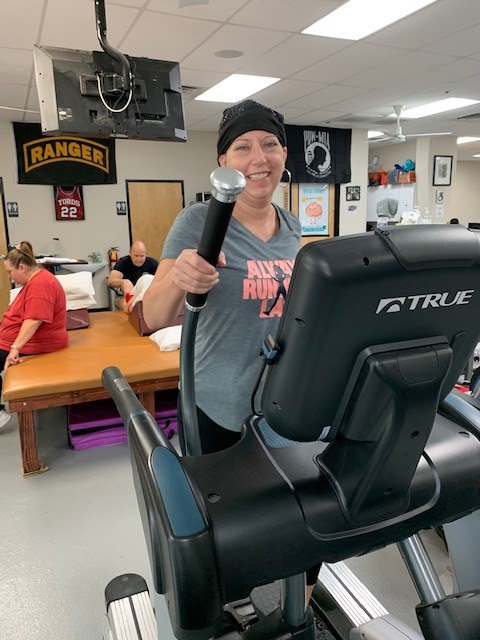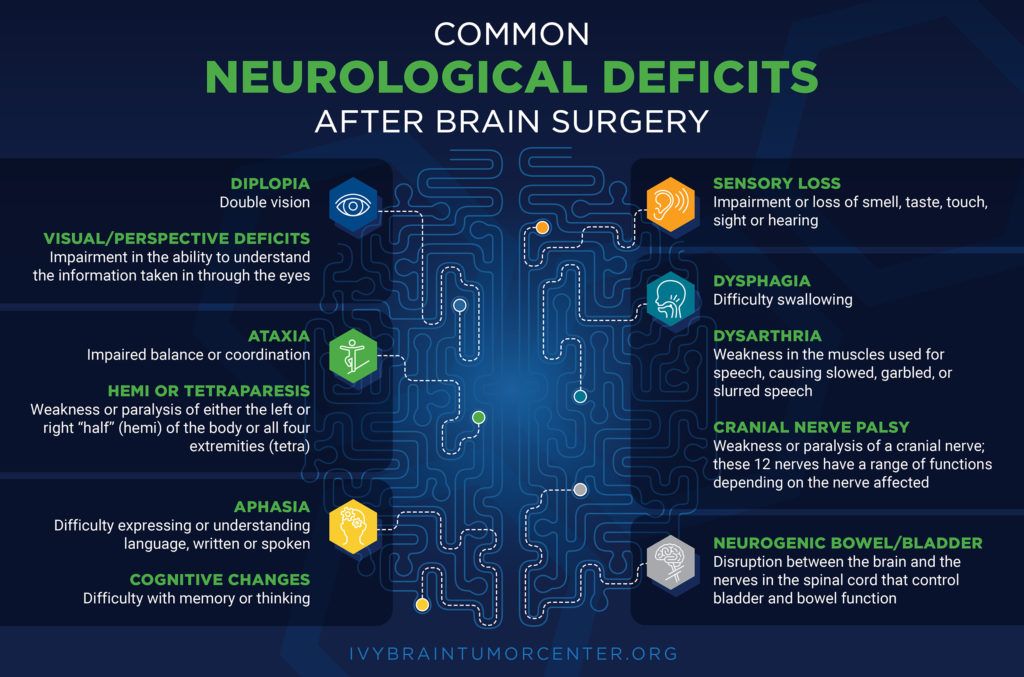
Ivy Blog
Brain Surgery Recovery – Four Tips for Faster Healing
- August 22, 2022
- Ivy Center
- Posted in Patient Support

Brenda Emery still can’t stomp her right foot down. Doctors knew the surgery to remove a brain tumor would affect her right side. Tasks like driving and running are impossible, for now.
While her right side still isn’t fully recovered, her condition is much improved.
Brenda was diagnosed with a grade III Oligodendroglioma, a cancerous brain tumor.
Immediately after surgery, Brenda couldn’t move her right side and couldn’t speak – another prediction from her doctors.

Her care team, led by Nader Sanai, MD, director of the Ivy Brain Tumor Center and neurosurgical oncology at Barrow Neurological Institute, was prepared for those challenges and began working with Brenda right after surgery. She spent four weeks in the hospital, participating in in-patient rehabilitation at the Neuro-Rehabilitation Center at Barrow Neurological Institute. Brenda worked on motor skills, workouts for arm and leg strength, and eye exercises to fix the double vision she was experiencing.
Brenda was also facing cognitive issues. She couldn’t recall the date; the question didn’t make sense to her. The only date that would come to mind was her birthdate. Speech therapy helped to quickly recover Brenda’s communication abilities and resolve her cognitive deficits.
Today, three months after surgery, Brenda says she is about 75 percent back to normal. She’s currently undergoing radiation and chemotherapy and is still attending outpatient rehab. She’s getting around well now and working on getting her right foot to stomp so she can get back to running, a favorite hobby.
Her advice to others recovering after brain surgery: “It’s easy to get frustrated. Be patient with your recovery.”
Brain Recovery Mechanisms
The brain’s ability to retrain or rewire itself and make new connections – its neuroplasticity – is working overtime after brain surgery or injury.
“All brains are capable of learning and growing and developing no matter how many insults or challenges the brain has faced,” says Dr. Joseph Ostler, MD PhD, physiatrist with Barrow Neurological Institute.
The size and location of the tumor, and how much tumor is removed can affect a person’s recovery. Patients with tumors in eloquent areas, such as on or near the motor strip or speech and language areas, usually require physical or speech therapy or both. Patients benefit from comprehensive therapies that include physical and occupational therapists and speech-language pathologists.
Due to a combination of effects of anesthesia, anticipated swelling in the brain and cranial discomfort after surgery, patients often report feeling worse temporarily, before they start to feel better. The most common neurological deficits after brain surgery include:

While each person’s recovery will look different, here are some tips patients can do to speed up the healing process. Be sure to talk to your doctor to make sure these tips will benefit your individual recovery.
Sound Sleep Helps the Brain Recover
Quality sleep, and getting enough of it, is as essential as food and water, according to the National Institute of Neurological Disorders and Stroke. Sleep aids in recovery and is important for a number of brain functions. Getting good sleep maintains the pathways in the brain that help with learning, creating new memories, concentration and quick responses.
Our brains don’t go to sleep when we do. The brain stays active and goes into recovery mode. Lack of sleep hours and sleep quality can hinder recovery after brain tumor surgery.
To help you get some quality sleep, try these tips:
- Set a schedule and try to go to sleep and wake up at the same time every day.
- Do some light exercises each day but no later than a few hours before going to bed.
- Avoid caffeine late in the day, and alcoholic drinks before bed.
- Create a relaxing routine, like a warm bath or reading, to prepare your body and brain for sleep.
- Create a sleep sanctuary. Avoid bright lights and loud sounds and keep the room at a comfortable, slightly cooler temperature.
- Don’t lie awake in bed. If you can’t fall asleep, do something else, like read a book, until you feel tired.
- See your doctor if you have trouble sleeping. Most sleep disorders can be treated effectively.
- Minimize or avoid screen time – use of mobile phones, tablets and computers just before bedtime can lead to poor sleep quality.
Good Nutrition and Positive Activities
Nutrition is an important factor before, during and after brain surgery and treatment. Quality nutrients fuel your body’s ability to retain strength and endurance. It’s important to put good things in your body and brain that boost recovery. Positive activities like spending time with family and friends, planning a fun event, light exercise, gardening and attending therapy are good options.
A healthy diet can also fuel the brain and aid in recovery. The brain requires energy to function, even more so when recovering from brain surgery. Healthy, whole foods, fruits and vegetables, and those high in protein and rich in vitamins and minerals help to encourage brain health.
Dark, leafy green vegetables, like kale and spinach, are nutrient-dense superfoods. They contain a variety of vitamins and omega-3 fatty acids, which are critical for brain health, recovery and neuroplasticity. Fatty fish, like salmon, mackerel and sardines, are chock full of omega 3s, which also help to reduce inflammation. Flaxseed oil is another good source of omega-3 fatty acid. Foods with higher levels of choline, like eggs, have been shown to produce better overall cognitive functioning.
Avoid Foods That Hinder Healing
Diet can have a major impact on brain health – positively and negatively. Foods that are inflammatory, like those high in sugar, refined carbs, unhealthy trans fats and processed foods can lead to memory and learning impairment.

Alcohol consumption should be avoided in patients with brain tumors. Alcohol use can lower a person’s threshold for seizures, making them more likely to have a seizure. This is important for patients with brain tumors because the brain tumor’s presence alone can increase the risk of seizures. Those taking anti-seizure medications should not consume any alcohol.
While fatty fish are good sources of omega-3 fatty acids, some fish and seafood contain too much mercury. Mercury is a heavy metal contaminant and can be neurotoxic, which can damage the brain. Mercury can move throughout the body and often accumulates in the brain, liver and kidneys, also in the placenta and fetus of pregnant women. Most fish are not significant sources of mercury and can safely be eaten in moderation. Fish with the highest levels of mercury are shark and swordfish.
While omega-3s are essential for reducing inflammation and promoting brain health, too much omega-6 fatty acid – found in many processed oils and even pumpkin seeds – can increase inflammation.
The main ingredient in sugary drinks like soda, fruit juice and sports and energy drinks is high fructose corn syrup. An animal study has shown a link between high fructose corn syrup (HFCS) and a reduction in brain function, memory and the formation of neurons. The study also suggests that eating foods rich in omega-3 fatty acids, see above, can reduce the effects of HFCS. While more studies are needed to confirm the findings, the results suggest that drinks made with HFCS can negatively impact the brain.
Boost Neuroplasticity with Brain Bootcamp
Give your brain a workout. Part of a successful brain surgery recovery is challenging your brain with cognitively stimulating or engaging tasks. Any activity that requires focus and engagement can give your brain a boost.
Memory games, puzzles, painting, yoga and meditation – these activities have therapeutic value and aid in recovery. Brain games can improve brain function, such as memory, attention, the ability to switch from one task to another, and the speed of processing.
While some neurologists caution that keeping the brain healthy is more complex than doing a crossword puzzle every day, cognitive stimulation can encourage neuroplasticity. It’s important to challenge your brain by trying different games or tasks regularly.
The therapists at Barrow Neurological Institute have compiled a list of fun ways to work on rebuilding cognitive and physical skills.
This story is for general health information only and is not meant to be used as medical advice, diagnosis or treatment. Please consult your physician or healthcare provider before beginning any treatment protocol or with any questions. This story reflects the health status of this particular patient at the time the story was written and photographs were taken. The patient’s condition may have changed over time.
References:
- https://www.ninds.nih.gov/health-information/patient-caregiver-education/brain-basics-understanding-sleep?search-term=sleep
- https://www.flintrehab.com/best-foods-for-brain-injury-recovery/
Medically Reviewed by: Linda Herrmann, RN, FAANP, PhD
